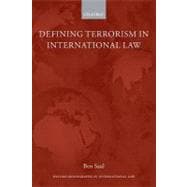
Note: Supplemental materials are not guaranteed with Rental or Used book purchases.
Purchase Benefits
What is included with this book?
| Introduction: Concepts of Terrorism | |
| Reasons for Defining and Criminalizing Terrorism | |
| Nature of International Crimes | |
| International Criminological Policy | |
| Terrorism as a Discrete International Crime | |
| Elements of a Definition of Terrorism | |
| Defending 'Terrorism': Justifications and Excuses for Terrorist Violence | |
| Common Justifications for Terrorism | |
| Criminal Law Defences to Terrorism | |
| Circumstances Precluding Group Responsibility | |
| 'Illegal but Justifiable' Terrorism | |
| Discretion and Law: Never Negotiate with Terrorists? | |
| Terrorism in International and Regional Treaty Law | |
| Transnational Criminal Law Treaties | |
| Treaties of Regional Organizations | |
| Attempts at Definition in Treaty Law 1930 - 2005 | |
| Terrorism in Customary International Law | |
| UN General Assembley Practice | |
| UN Security Council Practice | |
| Judicial Decisions Defining Terrorism | |
| National Terrorism Legislation | |
| Terrorism in International Humanitarian Law | |
| Early Developments 1919 - 1948 | |
| Second World War and Aftermath 1939 - 1948 | |
| 1949 Geneva Conventions and 1977 Protocols | |
| International Criminal Tribunals since 1993 | |
| Individual Criminal Responsibility for 'Terrorism' | |
| Customary Crimes of Terrorism in Armed Conflict | |
| US Military Commissions and 'Terrorism' | |
| No Separate Category of 'Terrorist' | |
| Conclusion: Proving Terror, Avoiding Duplication | |
| Conclusion | |
| Bibliography | |
| Table of Contents provided by Publisher. All Rights Reserved. |
The New copy of this book will include any supplemental materials advertised. Please check the title of the book to determine if it should include any access cards, study guides, lab manuals, CDs, etc.
The Used, Rental and eBook copies of this book are not guaranteed to include any supplemental materials. Typically, only the book itself is included. This is true even if the title states it includes any access cards, study guides, lab manuals, CDs, etc.